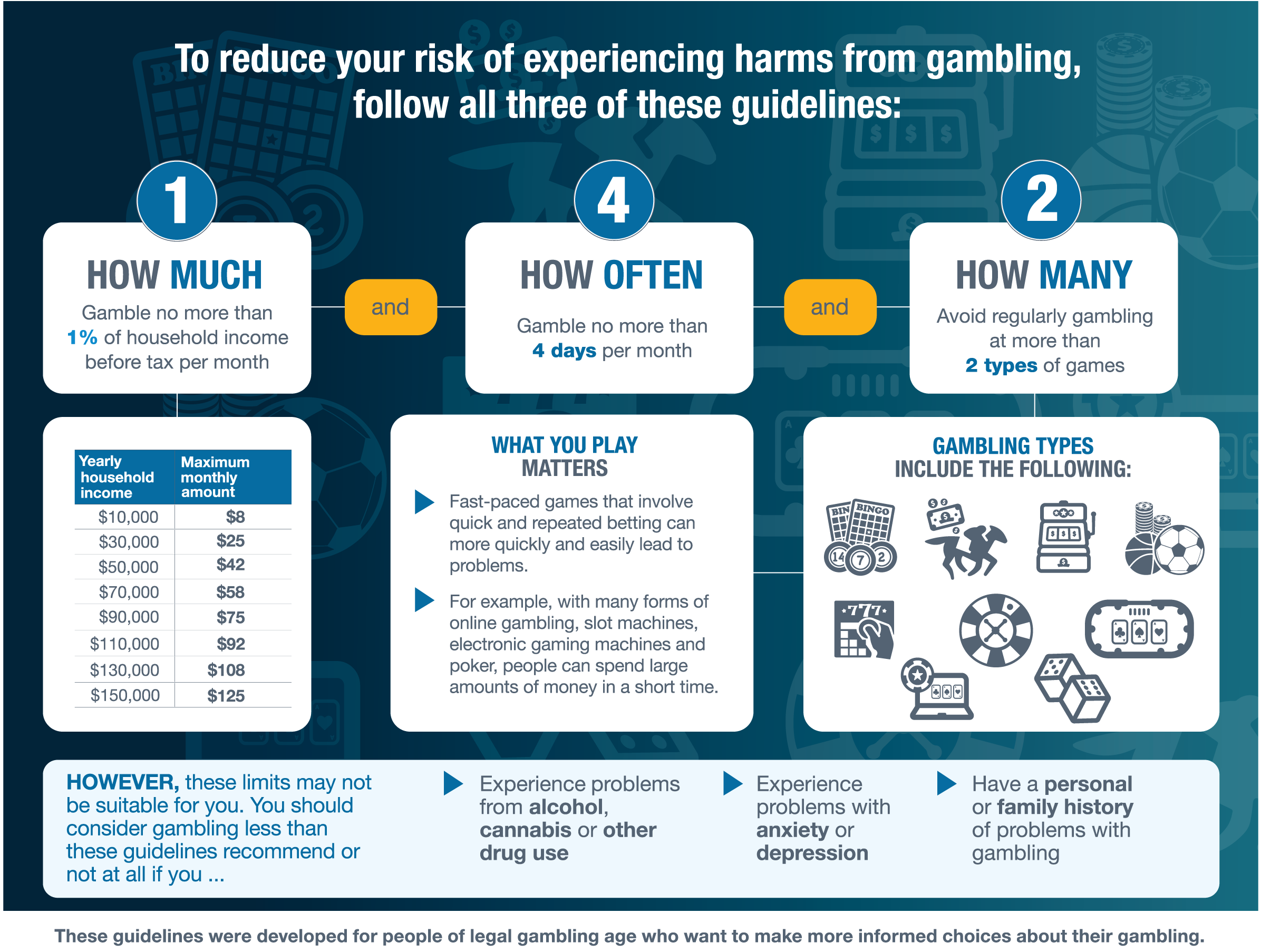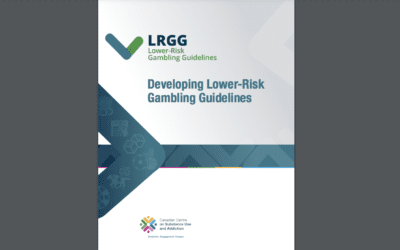HEALTHY PLAY
There’s a paradigm shift emerging from thought leaders who focus on responsible gambling. For years, it was the player’s sole responsibility to protect themselves from harmful play. Now, the concept of “healthy play” is rising in importance.
There’s a growing acknowledgement in the gambling industry that operators and regulators can do more to reduce the harm a vulnerable player may experience. Some brick-and-mortar establishments and online sites are taking a more serious approach to implementing robust responsible gambling programs because it makes business sense. These newer programs are taking into consideration:
- a shift to harm reduction and supporting safer gambling for all,
- the need to prioritize harms to affected others,
- the value of prioritizing financial harms,
- the need to reinforce ideal consumer behaviors, and
- ensuring staff is well trained.
Encouraging “informed play” through education and awareness resources is increasingly seen as a vital objective for making gambling safer for most players. Operator efforts have evolved in this area, with branded programs that encompass resources to ensure players understand games, odds, myths, risks and strategies. Behavioral change, however, remains elusive. Highly accessible resource centers located on the floors of casinos with personalized approaches show promise, but more research is needed.
Responsible gambling tools offer all players the opportunity to self-monitor and control their gambling activity. The following two tools are the most common and show great potential for harm reduction, with a clear focus on financial harm, while more work is needed to effect behavior change:
- Limit-setting tools (time and money). While they show promise, limit-setting tools may be more effective when more widely used.
- Self-assessment tools. Although there is virtually no research on their use in gambling settings, self-assessment tools offer a window for communication with a player who is reflecting on their gambling attitudes and behavior.
Cash and credit policies regarding on-site access to funds for gambling are beginning to be considered as part of safeguard and prevention efforts.
Measures for identifying risk are used to mitigate negative impacts for the subset of players who exhibit risk behaviors.
Measures for responding to players who exhibit risk can potentially mitigate potential harm.
Why is MNAPG encouraged by healthy play? We know that 96 percent of the general population doesn’t have issues with gambling and for the 78 percent of Minnesotans who do gamble at least once a year, we want the experience to be fun and free from harm. Healthy play does not remove all the risks from gambling but it recognizes and promotes the roles that regulators, operators and players have in minimizing harm and maintaining entertainment value. However, this does not diminish our commitment to advocating for those negatively impacted by problem gambling. Totally eliminating gambling disorder is highly improbable. Movements towards a comprehensive effort around healthy play may provide greater insights to those who have a gambling problem.
HEALTHY PLAY
Getting a Handle on Gambling Debt: Advocates Say End of Tax Filing Season an Important Reminder to Reassess Gambling Behavior and Related Financial Trouble
Minnesota Alliance on Problem Gambling stresses warning signs of financial issues caused by the addiction. READ MORE
International News — Could Denmark’s Practices Work Here?
Denmark is mandating player cards for better tracking. Would it work in Minnesota? READ MORE
Developing Lower-Risk Gambling Guidelines
A first of its kind study and accompanying guidelines to lower the risk of gambling harms is commissioned by the Canada Centre on Substance Use and Addiction. Read the study here. MNAPG will be promoting these guidelines. READ MORE
TIPS FOR HEALTHY PLAY
Following these tips can help you to stay safe if you choose to gamble. Understand the risks and benefits of gambling – be aware of your own reasons for gambling. The responsibility of balancing these risks and benefits rests solely with you.
- Don’t think of gambling as a way to make money
The venue is using gambling to make money. It’s not designed to work the other way around. Over time you will give away more money than you receive! Think of gambling as an entertainment expense – just like buying a movie ticket. - Only gamble with money you can afford to lose
Gamble within your weekly entertainment budget, not with your phone bill or rent budget. - Set a money limit in advance
Decide how much you can afford to lose before you go to play. When it’s gone – it’s over! If you win, you’ve been lucky, but don’t be disappointed if your luck doesn’t continue. - Set a time limit in advance
It’s easy to lose track of time when you’re gambling. Set a time limit or alarm, and when time’s up – quit! Odds are that the more time you spend gambling, the more money you will lose. - Never chase your losses
If you lose your set money limit and then try to win some of it back before you leave, then you haven’t really set a money limit. Chasing your losses will usually just lead to bigger and bigger losses. - Don’t gamble when you’re depressed or upset
Decision-making can be more difficult when you’re stressed or emotionally upset. Make sure you only gamble when you’re feeling happy and clear headed. - Balance gambling with other activities
When gambling becomes your only form of entertainment, it’s unlikely that you’re still just gambling for the fun of it, and your gambling may even be a problem. Make sure gambling isn’t your only pastime. - Don’t take your bank card with you
This is a good way to safeguard your money limit and not let being “in the moment” warp your judgment. - Take frequent breaks
Gambling continuously can cause you to lose track of time and perspective. Step out for some air or a bite to eat at regular intervals. - Don’t drink or use drugs when gambling
Drugs and alcohol cloud judgment, and good judgment stands as your main line of defense against letting gambling get out of control. - Remember that, while gambling can be fun, it is not a way to solve problems
If you gamble on a regular basis, it’s a good idea to keep track of the money you spend on the activity. It will help you to keep a realistic record of your gambling expenses. Remember to put a pre-set amount (the amount you plan to spend for the day) on the first line. Then, at the end of the day, you can compare that amount with the amount you actually spent.
Keep in mind that, despite all the above responsible gambling tips, for some people, any gambling can put them at risk. For these people, the only safe gambling may be no gambling at all.
- POSTIVE PLAY SCALE
- LOWER RISK GAMBLING GUIDELINES
- BEST PRACTICES IN RESPONSIBLE GAMBLING
- FUTURE PROOFING THE INDUSTRY
In late 2019, MNAPG commissioned Dr. Richard Wood to conduct a positive play study (PPS) in Minnesota. The survey included 1,000 self-identified gamblers, 80% of whom indicated they had gambled at least once in the previous 12 months. The purpose of the PPS is to measure whether an individual is playing responsibly by examining the following four dimensions of positive play behaviors and beliefs:
- honesty and control — the extent to which players are honest about their play to others and whether they feel like they’re in control,
- pre-commitment — setting up limits of time and money prior to playing),
- personal responsibility — the extent to which a player believes they should take ownership of their gambling behavior, and
- gambling literacy — the extent to which a player has an accurate understanding about the nature of gambling (what the player knows about the games, such as odds and payouts).
The scale emphasizes positive experiences over negative warnings and seeks to change the language from identifying someone as a problem to promoting healthy playing. The results of the Minnesota survey indicated there’s a greater need to improve gambling literacy and the ability to pre-commit in the 18-34 age segment. This means more prevention work should be focused on this age group, including understanding what games they’re attracted to and providing specific information that will lead to higher understanding of the games they play, such as the odds and risks involved.
The full report can be found here.
The Lower Risk Gambling Guidelines (LRGG) were produced by the first large-scale, comprehensive project in the world to develop lower-risk gambling guidelines. Published in the fall 2021, the guidelines provide a set of quantitative limits and a summary of information about special risk populations, contextual factors and other health messages that should be included when educating the public about how to gamble in a lower-risk manner. These guidelines are the result of:
• Collaboration with an international group of experts made up of the some of the top gambling researchers in the world;
• Risk curve analyses of over 60,000 people who gamble from eight different countries;
• Feedback from over 10,000 Canadians collected via an online gambling survey administered twice;
• A series of interviews and focus groups with over 50 people who gamble from across Canada;
• Two comprehensive literature reviews; and
• Consultation with a pan-Canadian, multi-sectoral advisory committee of over 20 members.
This work was funded by the Canadian Centre on Substance Use and Addiction (CCSA) and are making these guidelines open and available for use around the world.

When gambling, what you play matters.
Fast-paced games that involve quick and repeated betting can more quickly and easily lead to problems. For example, slot machines or forms of online gambling or electronic gaming machines, people can spend large amounts of money is a short time.
However, these limits may not be suitable for you. You should consider gambling less than these guidelines recommend or not at all if you
Experience problems from alcohol, cannabis or other drug use
Experience problems with anxiety or depression
Have a personal or family history of problems with gambling
SAFER GAMBLING TIPS
Try to limit your consumption of alcohol, cannabis and other drugs while gambling. This will make it easier to stick to the guidelines.
• Try to limit your access to money. Consider leaving credit and debit cards at home. There are also apps that can prevent your phone from making payments.
• Try to schedule activities right after gambling sessions, which can set a limit on the amount of time you have to gamble.
• Gambling with other people can affect how you gamble. Think about how having gambling companions or gambling alone might impact you.
• Entertainment money. It is important to keep in mind how much money you are able to spend on entertainment when deciding how much to gamble.
• Set limits. If you have a big trip or special event coming up where you’ll be gambling, plan ahead, remember the guidelines and set limits.
HARMS OF GAMBLING
People who gamble can be at risk of financial harms, relationship conflicts, emotional or psychological distress and health issues. Following the guidelines can hep reduce your risk of gambling harm.
Compare your gambling with the LRGG
The interactive risk assessment tool shows you how your gambling practices compare to those recommended by the Lower-Risk Gambling Guidelines. Visit www.gamblingguidelines.ca and try it now.
If you’re interested in comparing your gambling with other Minnesotans, try it here.
Interested in reading the study and development of the guidelines? Click here. Full study.
The Responsible Gambling Council in Canada has produced a best practice, accredited responsible gambling program that has been recognized as the gold standard for the industry, called RGCheck. Operators benefit from a complete roadmap to implement responsible gambling standards. Their program is backed by rigorous safeguards that protect players and fosters a sustainable player base. The benefits of applying these standards to one’s operations are:
- recognizing gambling venues and igaming sites that have achieved high standards in responsible gambling programs,
- providing operators with an objective evaluation of their responsible gambling policies and procedures,
- identifying areas of strength, as well as areas where improvements can be made in their responsible gambling efforts,
- providing gambling venues and online gambling sites with effective tools for improving responsible gambling programs and services on an ongoing basis,
- assuring people who gamble that gambling providers take their safety seriously, and
- increasing public confidence.
The National Council on Problem Gambling has also developed a series of recommendations and best practices for Internet Responsible Gambling Standards, Responsible Gaming Principles for Sports Gambling Legislation as well as Fantasy Sports Consumer Protection Guidelines.
What exactly does “future proofing the industry” mean? It’s an aspirational goal to reach the point where an operator refuses to gain revenue from those exhibiting problem gambling behavior. This may seem like a pie-in-the-sky goal, but several countries are taking steps through advancements in technology that enable them to better identify customers who are taking too many risks in their gambling and engaging them in conversations about the risks and potential financial harm. Their overarching goals are to provide safeguards and prevention initiatives to identify the harm to the problem gambler to alert them to negative changes in behavior.
The following papers were presented as part of the 2020 New Horizons Conference sponsored by BCLC and were the reference points for the conference presentations:
- Judith Glynn Future Proofing the Industry: Player Safeguards and Prevention, March 2020
- Kahlil Philander, Future Proofing the Industry: Organizational Structure and Responsible Gambling, March 2020
- Jonathan Park, Future Proofing the Industry: Towards the Safer Design and Situation of Games, March 2020
Papers found at RESOURCES: HEALTHY PLAY



